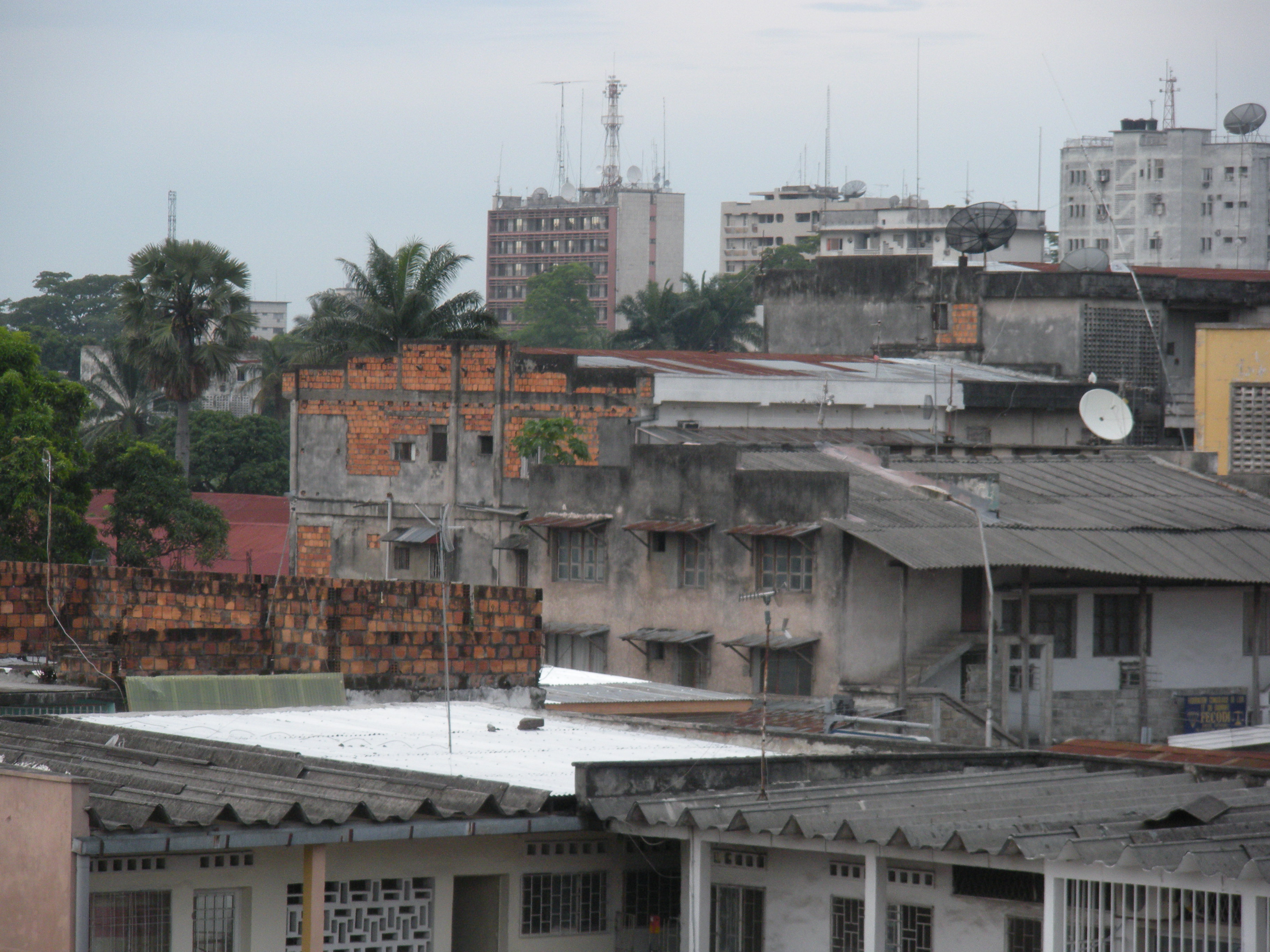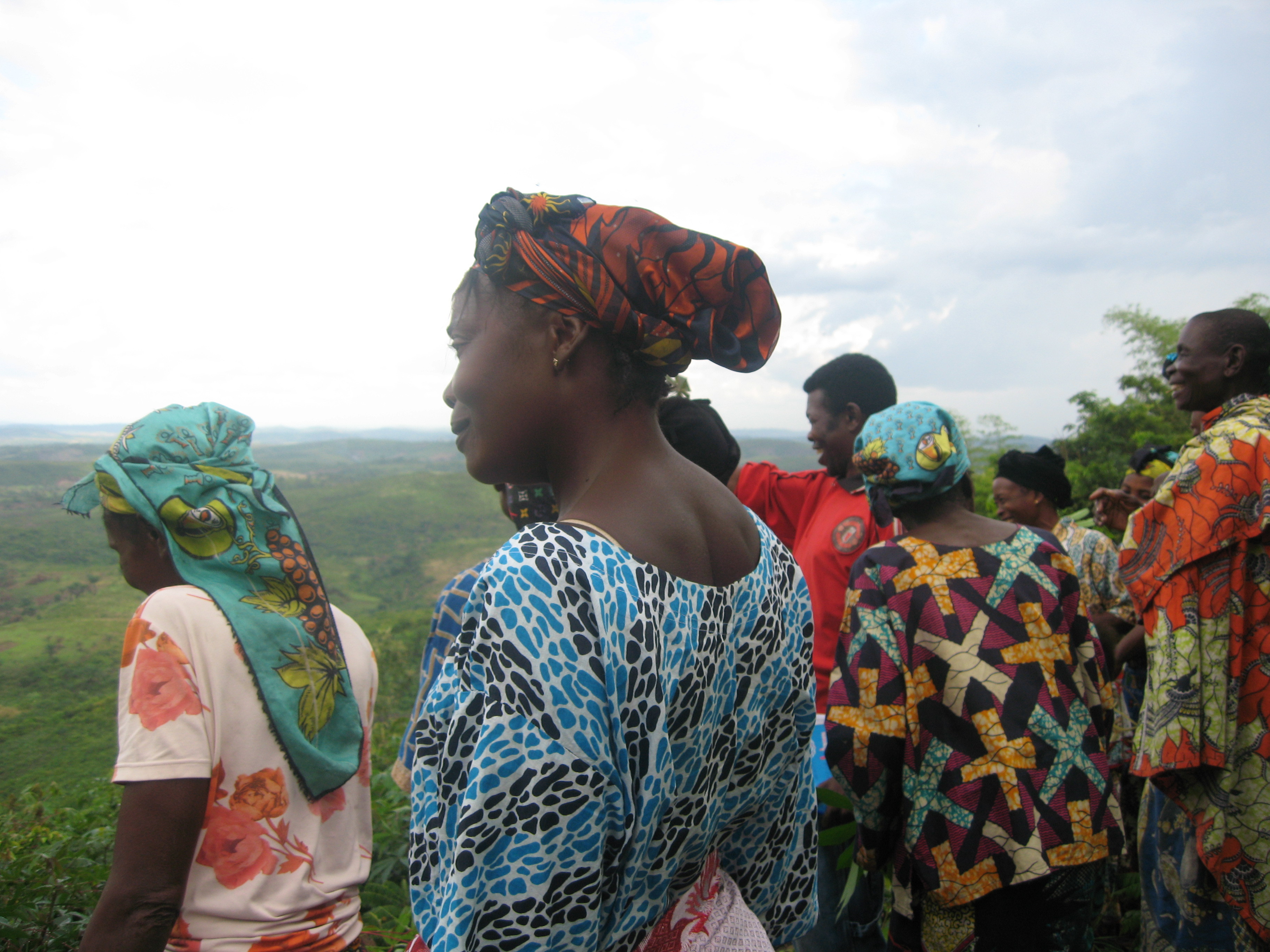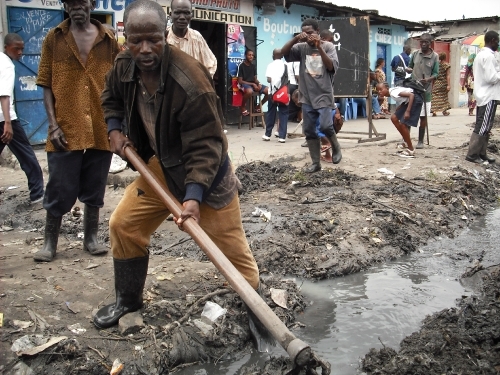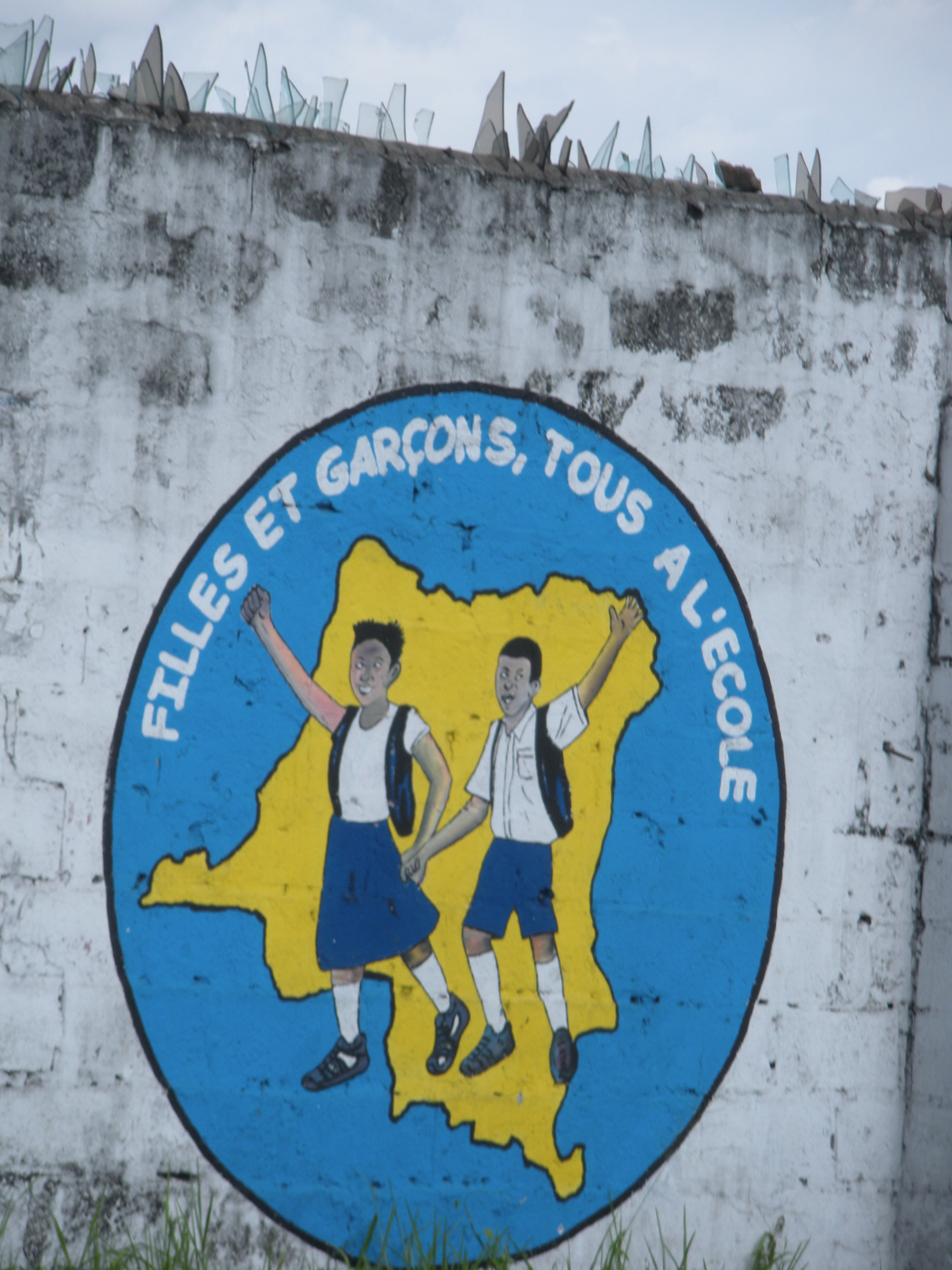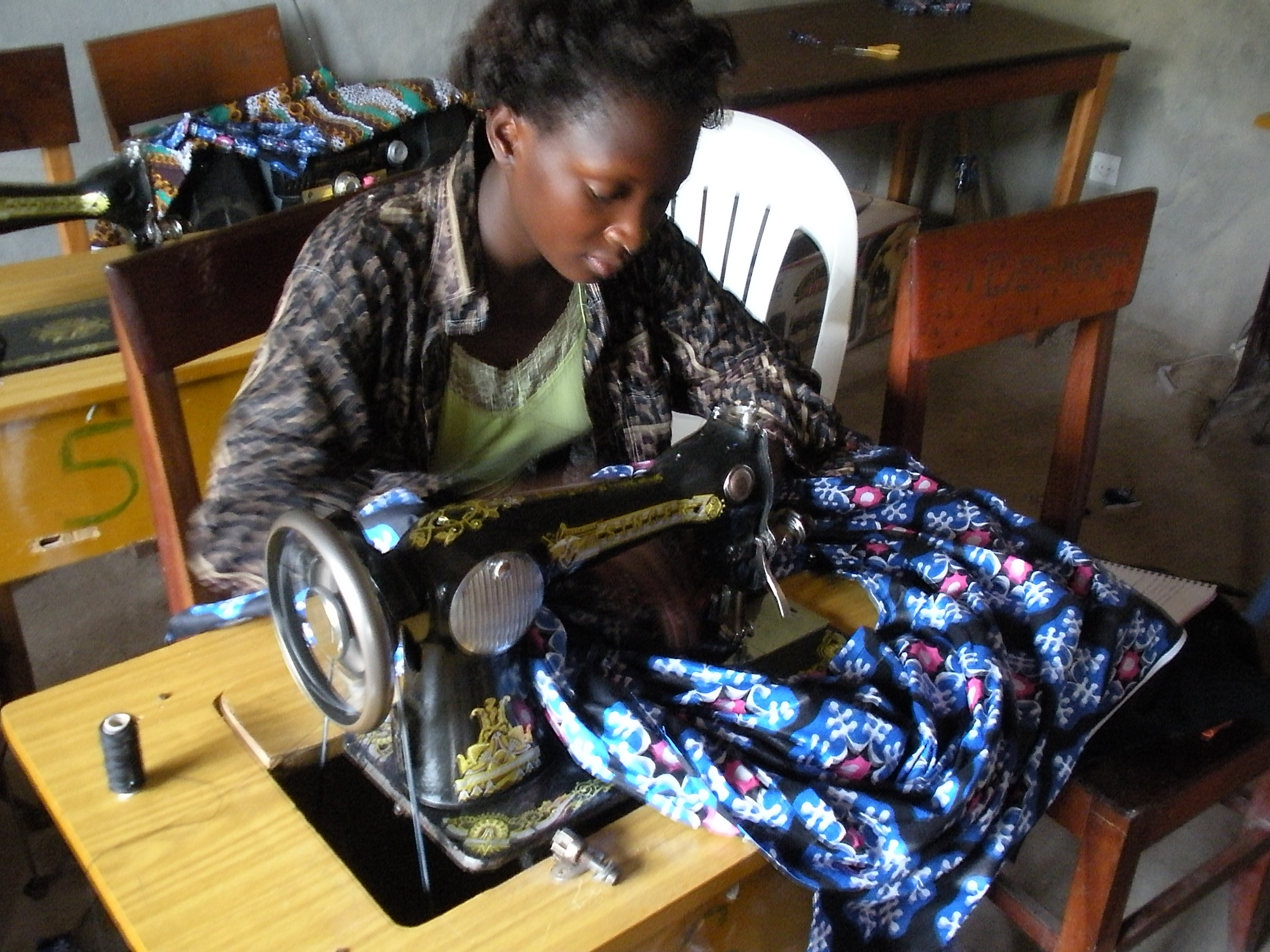In October, 2008, as part of an internship with Christian Aid, I traveled to Kinshasa in the Democratic Republic of the Congo.
All images by Adam Gardner
I was completely unprepared for what was before me, and unprepared for the appearance of calmness from those around me. Being the youngest in the group made me intensely aware of my inexperience and lack of knowledge. One of them, James, had a tattoo on his wrist. I had to ask him what it was. It was a clay pot. It served to him as a reminder that humans are made from clay not gold. We are cracked and broken and it's okay that we make mistakes.
On arrival we were faced with the expected scene of children asking for money and our cold resolution to deny them. It became harder throughout the trip. I'd be talking to children or playing with them when suddenly they'd ask for money. It made me feel like I wasn't a person, but a rich foreigner. That money would always act as a barrier to friendship. I came to hate their asking, their inability to have faith in their own country to provide.
On that first evening, driving along what was supposedly a main road in the dark of night with no street lights to show us the way, every detail stood out. The people clinging onto the backs of cars driving far too fast. The surprise that there were women in traditional African dress who really were carrying bananas on their heads. The lack of any structure -- from lane markings and crossings to doors on shops. In my diary, I described it as a "mess." I can think of no better word.
That first night I lay in bed, tangled in a mosquito net, I couldn't put up. Missing people at home because I knew that over the next few weeks I'd be lucky if I got a couple of emails from them. I listened to the sounds of unknown animals as I fell asleep, for some reason hoping they were birds.
As a non-Christian in a group composed mainly of Christians, I learnt just as much about religion as I did about poverty. On the first morning while driving to church, I noticed my surroundings a little less. In some ways you notice less in the day because you're not trying so hard. Trying to relate to faith, I thought back to a moment where me and my mom had been sat together. We hadn't been talking much recently; we seemed to be constantly frustrating each other. We both let it all pour out and cried on each other's shoulders. She said she loved me and kissed me on my eyelids. That moment held me through other moments, reminding me that that's what lies beneath. I wondered if faith was like that. If people had moments when God was so clear to them, that they could hold on in moments of doubt.
Later that day, quite unexpectedly, I met a man who was one of those rare individuals that fills you with awe. Some of the people in the group were journalists; they'd begun interviewing a man who worked at the pool we had the luxury of swimming in.
He said he now worked three days a week to provide money for his family, where he used to play basketball three days a week. He didn't celebrate his last birthday: he had no time and no money. It was all invested in education. He wanted to be a pilot. He described education as one of the first priorities in our lives -- it teaches people their rights and empowers them. Through out the rest of my time, everyone I met had a plan that they were working hard towards -- being a doctor or a lawyer or an engineer. They weren't short of ambition, but it was hard to see how their aspirations could manifest in such a reality.
He told me that he loves his country despite its faults and that the people there are like brothers and sisters. His country, he said, had gotten worse not better. What he loved most about the people was their faith.
Reflecting on it that evening, I realized I didn't know his name. I also realized I hadn't been deeply inspired or moved, or shocked by anything he said. What was left with me was the surprise that I hadn't even thought to ask his story. I hadn't even considered what his story might be. Instead I'd wrongly assumed that he wouldn't be as educated or as motivated as he was.
I tentatively stayed in the room whilst people prayed out loud, at first feeling slightly uncomfortable. But I was moved by what people said. Someone prayed for people back home, and asked that they would know we were where we should be. Some people said thank you for being able to make a difference. It was the last thing I felt like I was achieving. Poverty seemed too big. I hoped that my cynicism would pass.
In the following days I became increasingly aware of the amount of barbed wire. It seemed to demonstrate that people could rely on no one but themselves. It symbolized the lack of organization. As did all the piles of rubbish being burnt at the sides of the roads, and the church with its smashed windows.
We helped to dig holes -- I'm still not sure what for. I think drainage to help prevent inevitable cracks on the roads. One man I was speaking to kept describing Africa as hell. I think I'd had an idea in my head that poverty appears much worse to us because of what we're used to and that people there would be happy despite their situation. They were all really serious. There weren't a lot of smiles.
An orphan I spoke to said the most important people in his life were those who helped. When I asked him who helped, he said no one. I felt irritated rather than moved. I don't know if that's because his repeated appeal to foreigners made me feel like he was asking me for money I couldn't give, or because everything felt like too much going round and round in my head. It didn't affect me because I couldn't grasp it. It's too far from anything I know. It felt like all the structures I was used to that made change happen simply didn't exist.
Stories like his became almost generic throughout the trip: a young girl whose parents had died, another young boy whose parents had divorced. The boy's mom's new husband kicked him out of the house. They came to feel like something I'd already heard too many times. It felt like it didn't have meaning or character. It felt like I was reading it. But for him it's real; it's his life.
I interviewed a man. He said that what kept him going was hope. The biggest tragedy in life is when people are forcibly separated from those they love. The best advice for living is to share love with people. Not to let our prejudices become barriers to that love. We should stand together. He said he was part of a rap group and, for him, music is a way of sharing. I was expecting him to say music made him happy -- he didn't. He said that what made him happy were his friends and family. He also stressed the importance of faith, which he did not doubt. I couldn't help but wonder if the idea of questioning faith, would be too difficult for someone who needed it as a grounding in such difficult circumstances.
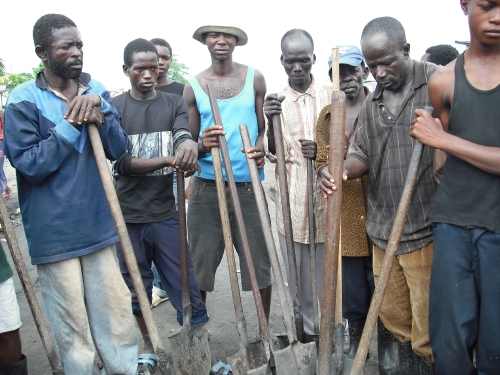
Talking to Caroline (another intern) about my irrational fear of H.I.V, I was amazed to find that she turned it into a good point. It could be used for empathy and compassion. She told me a story of a boy on a beach, surrounded by thousands of stranded starfish dying on the sand. A man walks by to find him throwing them back into the sea. The man asks him what he's doing and if he really thinks he's making a difference. The boy throws one into the sea and replies, "I just gave that one a life."
The DRC is a country trying to build a democracy, and one man's optimism particularly touched me. He said that one person can only do so much, but the next person can take off where they finish. He was aware that the first set of elections had achieved little, but was confident that this was a start.
Kevin (also working for Christian Aid) reminded us that we'd been told at the beginning of our internships that poverty should make us angry. He said that today he'd felt really pissed off. No one should have to live like that. He said he normally asks people about their hopes when he talks to them. The man he'd asked that day had looked at the people near him, he looked up and down the street, he looked at the work we were helping him with -- digging rubbish and excrement from a crude drainage system. And he said, "My country, the DRC? It's fucked."
I talked to Kevin afterwards. He said that every conversation he had here contained so much that he felt overloaded and like he wanted to capture everything. He said that he was reminded of Sisyphus, who was sentenced to eternal punishment by the gods. Everyday he rolled a giant rock up a steep hill and everyday it rolled back down before it reached the top. I like to think that people can still find happiness in such a fate.
From the start, I kept a diary meticulously, recording everyday. But it became more and more apparent that what was affecting me was so non-specific, non-quotable and non-formed -- into even vague rambling ideas -- that I couldn't capture it all. The diary entries became less frequent. They were no longer a record of my journey, but an attempt to organize a mess of thoughts.
When I at last met people who were H.I.V positive, I'm ashamed to admit, I felt constantly agitated. I got it into my head that the mosquitoes might transfer the virus. I kept spraying myself with insect repellent. A girl about my age, talked to us about the rejection she'd experienced after declaring her status. She was moved far away to a village where medication wasn't available. The woman running the centre we were at had told her that she couldn't do that to herself. She told us that if she was going to die, she would die here with her. She looked so defeated, that for the first time on the trip I found tears in my eyes. But I was in a room full of other people; I held them back. I stopped listening. I reassured myself that in the dark you have to open your eyes wider to let in the light.
Fortunately the next person we met, Alfonso, was one of the most playful and laughter-filled people I've ever encountered. His optimism somehow gave emotional reassurance to what I knew was an irrational fear. That day I realized how close I'd become to the people I was travelling with. How much it meant to me to have people going through a similar experience. One person, who was engaged, confided in me that she wasn't ready to get married. I wasn't sure why she told me, but I was the first person she told. She'd been intending not to tell anyone before her fiancé.
And there, rather abruptly, my diary ends. I'm left with only vague memories of the rest. The war breaking out on the other side of the country and us being told we might hear gunshots in the night. The brief appearance of the DRC in English news with its headlines about humanitarian crises. The trip to the countryside that showed me the natural beauty of the place. The bright stars, sheet lightning and stories by the fireside. The growing weariness and longing to be home.
Our group leaders had warned us that you go back feeling full of inspiration, but it wears of. What no one told me until after was that the culture shock could be bigger upon return. I remember standing in the middle of a crowded street in London, surrounded by all the things I'd forgotten the existence of, suddenly overwhelmed by them. I looked down at the stone paving, caught between happy and sad.
My eyes settled upon a bench, it filled me with a strange feeling of surprise and joy. An old couple made me aware of their absence in the DRC. I spent ages listing to my boyfriend all the things around me that I'd never fully appreciated: traffic lights, old buildings, traces of history and the presence of structure. But that was all I felt I could say. My memories seemed to have passed into a realm of obscurity, beyond any form of description I wanted to share. I still find myself changing the channel when charity advertisements come on.
